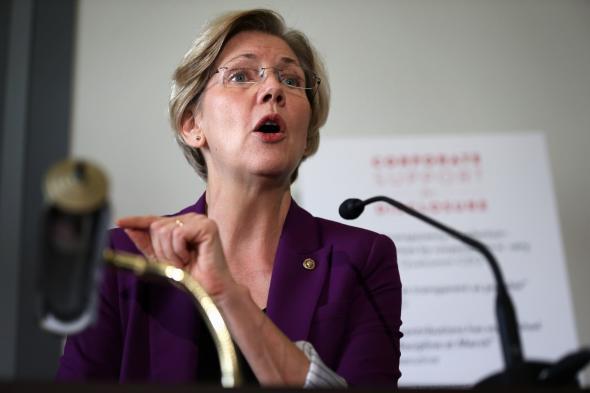Noam Scheiber’s piece on how Elizabeth Warren is poised to lead a populist anti-Wall Street crusade to beat Hillary Clinton in 2016 has a number of layers to it, and I commend the piece to you as containing plenty of insights and things to chew on.
But this piece, much like enthusiastic thinkpieces about Bill de Blasio, leaves me mostly hung up on a niggling public policy issue. If you think about cleavages inside the existing Democratic Party coalition, it’s certainly true that the question of attitudes toward Wall Street divides Democrats. It’s especially true that if you ask more left-wing Democrats what it is that they think separates them from more moderate Democrats, they tend to bring up Wall Street an awful lot. But I think that this is hardly the only divide. Another big conceptual issue, which I want to try to define in as value-neutral a way as possible though I definitely have strong views on it, is whether we should try to demand cost-effective public services or else whether we should view the public sector as a lever for the creation of good jobs and a standard-setter for wage and benefit levels throughout the economy. The specific issue where this arises most frequently has to do with K–12 education, where figures such as Barack Obama and Cory Booker and Rahm Emanuel find themselves battling with teachers unions over charter schools and work rules and so forth. But the same basic issue arises every time you have large numbers of front-line service providers. As Thomas Kaplan wrote last week for the New York Times, a wide array of labor unions representing city workers are hoping the de Blasio administration will give them retroactive raises, which by their nature won’t give New York City’s citizens much in the way of improved public services in exchange for their money.
Now this axis of conflict around a neoliberal versus social democratic conception of public-sector workers tends to map to the axis of conflict around Wall Street. But it does so in a curious way.
The way it works in practice is that since we have progressive income taxes in the United States and also an awful lot of income inequality, the social democratic conception gets its purchase in large part by making the case that it’s not your tax dollars that are going to finance these retroactive raises. Make the bankers pay! As Micah Uetricht put it, the left position on the Chicago teachers strike “rejects the logic of austerity that excuses underfunding of public schools based on budget shortfalls, arguing that tax increases for the rich should make up the deficit.” On the level of rhetoric, the message of higher taxes rather than increased service efficiencies (note that de Blasio proposes to finance his signature preschool initiative entirely through higher taxes on the rich rather than even partially by reallocating money away from NYC Public Schools or the CUNY system) is a great complement to the message of attacking parasitical Wall Street behavior.
But as a question of policy substance, there’s actually considerable tension here. Suppose that President Warren rides to town with a raft of new legislation and tough regulators and a set of U.S. attorneys firmly dedicated to prosecuting financial wrongdoing with the utmost rigor. Well if it works, the pretax income of Wall Street types is going to plummet. And while that might well be good for the country and the middle class broadly, it would cause the tax base in New York and California and other politically blue high-inequality jurisdictions to fall. Rather than hiking rates on the rich to pay for new programs and more generous wages, these places would find themselves either needing to tax the middle class (a much tougher sell politically) or else shift into a neoliberal efficiency-seeking mode. By contrast the Tim Geithner philosophy—regulate Wall Street but don’t seek to transform it or displace the sector from its leading role in America’s political economy—is a great match for the politics of progressive taxation to finance public-sector social democracy.
Which is to say that the alliance between labor unions and bank bashing is a very effective and powerful one as long as it doesn’t actually win. A big-city mayor doesn’t have the authority to crack down on Wall Street, so he or she is ideally positioned to tap the rhetoric of bank bashing in service of an agenda of progressive taxes and high spending. But a president really could take on the fat cats—not just taxing them but making their underlying businesses less lucrative, leaving less in the way of tax revenue to scoop up.
